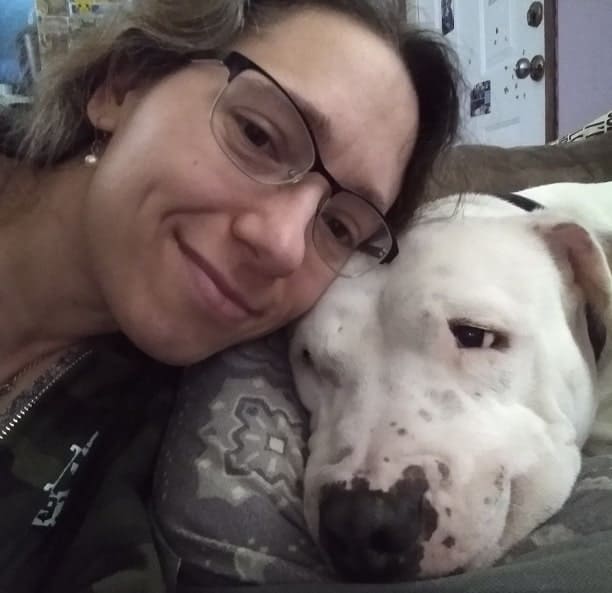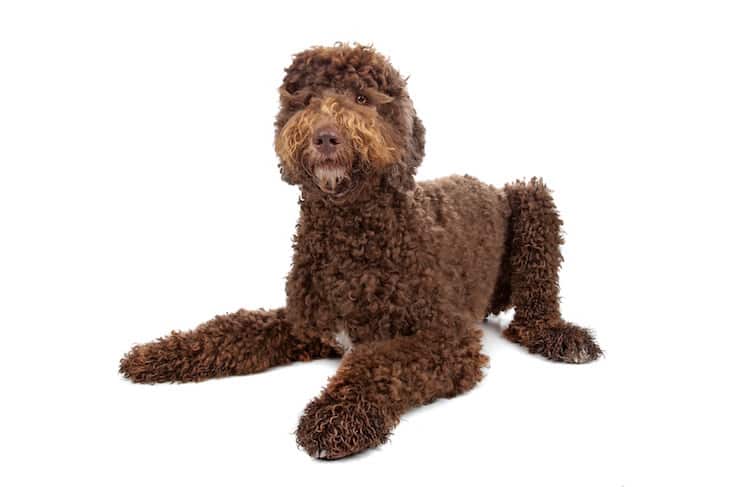The popularity of the Labradoodle comes down to one thing: the Labradoodle temperament. Labradoodles are happy-go-lucky dogs who are devoted to their families.
This hybrid dog is a cross between a Labrador and a Poodle, and there are three distinct sizes:
- Toy Labradoodle (between 15 and 30 lbs.)
- Medium Labradoodle (between 30-45 lbs.)
- Standard Labradoodle (between 45 and 100 plus lbs.).
If you are looking for an all-around great dog with few behavioral and health issues, the Labradoodle should be high up on your short list.
The Labradoodle Temperament and Personality
While the Labradoodle temperament depends largely on the temperaments of her parents, these crossbred dogs are typically happy-go-lucky and ready to learn!
Not the Best Choice for a Guard Dog
As a guard dog, the Labradoodle temperament is more likely suited to inviting a robber in and playing fetch, rather than guarding your valuables. In other words, if you're looking for a guard dog, this is not it.
She’s Great with Kids, But…
She is great with kids of all ages, but you must supervise her with small children because she can easily knock a toddler over with her enthusiasm.
Social Butterfly
Playing into the whole “she’s not a great guard dog” thing, the Labradoodle is a highly sociable animal. She loves to be around people because that means she may have more chances to play.
Crazy-Smart
The Labradoodle is so smart that she can tell when it’s time for play and when it’s not. And she’s not pushy about it either – if you don’t want to play, that’s cool. She’ll simply play by herself or lay down for a bit until you’re ready to join her.
Level-Headed
It should probably go without saying at this point, but you never have to worry about the Labradoodle getting into a fight. She’s calm and cool as a cucumber. If another dog starts messing with her, she’ll probably walk away or even just sit there and take it, looking to you for help.
A Brief History of the Labradoodle
The first known Labradoodle originated in Australia in 1989. His name was “Sultan,” and Wally Cronron, an associate with the Royal Guide Dogs Association of Australia created him to be the kind of dog a person with allergies could own.
Cronron also created the breed hoping that he would make for a fantastic guard dog. But, as we now know, that didn’t exactly work out. The Labradoodle is just too nice for the job!
Labradoodle Training
Labradoodle training is easy because they engage well with their humans and want to please them. You can also use a clicker and some tasty treats to move your puppy in the right direction.
One thing I cannot recommend highly enough is to start puppy class as soon as you get home from picking your new dog up. It’s never too early to start good Labradoodle habits.
What’s kind of funny about the Labradoodle temperament is that she is so nice that you actually have to train her to control it. What I mean by this is, if she’s a jumper – and most puppies are – you must turn away from her and wait for her to stop the behavior. When she does, click your clicker and give her a treat.
Helpful Dog Training Resource:
For help with training your Labradoodle dog, you should take a look at The Online Dog Trainer by Doggy Dan. Doggy Dan is an expert Dog Trainer based in New Zealand. His online resource contains Hundreds of Excellent Dog Training Videos that will take you step-by-step through the process of developing a healthy, happy well-behaved dog.
Best Place to Live
Because of her need for healthy activity, small apartments are not ideal for your Labradoodle. That said, if you have a dog park nearby where she can blow off some steam, this will certainly help her adapt better to urban living.
A nice big yard in the country or a beach to play on is pure Labradoodle heaven. And these pups love toys – the more the better!
Grooming
Labradoodles are not exactly what you would call “low maintenance” when it comes to grooming. You need to brush them every other day to prevent matting. Professional grooming is a good idea, too. Take her every 2 or 3 months to help remove her undercoat.
Caring for a Labradoodle involves smaller but just as important tasks related to grooming. For instance, you need to trim her nails and clean her ears each week. The former is self-explanatory, and the latter is because she is prone to ear infections as a result of her floppy ears.
Because the Labradoodle temperament is of the laid-back variety, you shouldn't have any trouble with these tasks. If you do, though, you should be able to train her out of her bad habits and help her adjust to healthier new ones.
Labradoodles are typically hypoallergenic, non-shedding dogs, thanks to the Poodle parent’s traits. However, there are some discrepancies in coat length and composition, depending on the dog. Sometimes a Labradoodle has Poodle-like curls, and sometimes she looks like a shaggy Labrador. It's up to her genes that determine what she's going to look like.
As far as Labradoodle colors go, they come in pretty much every color you can imagine, from brown to black to even lavender!
Labradoodle Health Issues and Concerns
Getting a Labradoodle puppy from a respected and responsible Labradoodle breeder can help ensure that you bring home a happy and healthy dog. When you go to pick out your dog, tell the breeder the kind of dog you’re looking for and give him information about your lifestyle. These things will help him match you to the best pup in his litter.
Also, and this is critical: Make sure the breeder provides you with all the appropriate health certificates. If he puts you off, or suggests his lines are nothing but healthy, it may be tough, but you need to walk away. Just because the pup you've fallen in love with is adorable and has a great personality, she may also have an underlying, untreated health condition.
Also, take a good look at the pup’s parents while you're there. If either of them shies away or growls, this is not indicative of the typical Labradoodle temperament. Do not buy a puppy from that breeder.
Your Labradoodle is prone to any health condition the parents have, but the intent behind crossbred dogs is to build up their immunity to certain diseases. Therefore, buying a dog with health problems kind of defeats that purpose – and further funds a bad breeder. However, you should still be aware of some of the conditions that affect both breeds, including:
Dog Health Resource
Important Note: Few things are more important than our Health. It's no different with our Dogs Health. Some visits (and Money) to your vet can be avoided if only you know what to do when your dog is ill. The Ultimate Guide to Dog Health is the answer. No dog owner should be without this handy guide. It's no substitute for your vet but it will Save you Money and Heartache. This Dog Health Guide will help you quickly understand and recognize symptoms before they become a serious problem for your dog. Click Here to see if you agree.
Exercise
One thing's for sure: Labradoodles are play-junkies. Throw a tennis ball, a stick or a Frisbee, and they will happily play on and on for hours. Because of this intense love of playing, the Labradoodle temperament is also well-suited to fly ball and agility training and competition.

Giving your Labradoodle at least 30 minutes of good romping will tire her out. And, as we all know, a tired dog is a good dog!
If you let that extra energy go unchecked, she will find more destructive ways of channeling it. And the last thing you need is your stuff chewed, or your garden dug up, simply because you didn’t exercise her enough.
Learn more about the benefits of regular exercise for your dog here.
Feeding
Labradoodles do better when given two meals per day instead of free-feeding, or “grazing.” This is because of their tendency to gain weight.
An overweight dog may suffer from both hip and elbow dysplasia.
Something to note that’s a trait on the Labrador side is gastric torsion or bloat. Bloat can happen when you feed your Labradoodle one large bowl of food, rather than two smaller meals during the day.
Bloat may sound harmless, but it's actually a very serious condition that can become fatal if you notice signs and don't get her treatment right away. Prevent this from happening by feeding your pup the recommended amount of the recommended food.
Finding the Perfect Labradoodle
If you would like to add a Labradoodle puppy to your family, you are probably wondering how you can do that.
You can find a Labradoodle for sale from a Labradoodle breeder or through your local adoption shelters.
Labradoodle Puppies for Sale
The average Labradoodle price is actually pretty high for a mixed breed dog, ranging between $2,500 and $3,000. This is without a doubt because of the popularity of this hybrid, who is everything a family could want in a dog.
It’s good to know the average range, though, because then it’s easier for you to tell when you’re getting ripped off, or when a breeder is grossly undercharging you. You may think you’re getting a great deal when, actually, what you’re getting is a dog with temperament or behavioral problems.
So, while a Labradoodle may be expensive, it is sometimes more of a guarantee to pay the higher price and not look for the best “deal.”
Labradoodle Adoption and Rescue
When it comes to adopting a dog, you can’t feel discouraged if the one you’re looking for isn’t there on your first try. A shelter’s “stock” changes all the time, depending on the dogs they find, or the ones people surrender.
If you’re looking for a Labradoodle at your local shelter and can’t find one, ask if the shelter can put your name on a waiting list. This way, the moment one comes in, they know to notify you first.
Remember though, it’s kind of a crapshoot when you adopt a dog. It’s difficult to get a dog’s history for a normal adoption, let alone the adoption of a hybrid dog.
You can’t know for sure sometimes if the dog is a First-Generation mix, meaning that the dog is not a Labradoodle bred with another Labradoodle. Dogs who are multiple combinations of mixed breeds are more likely to be sick or have wildly unpredictable temperaments.
Still, you should always consider adoption as your first choice, with the number of animals out there who are in desperate need of a loving home.
Another important thing to note, just because adoption fees are cheaper does not mean owning the dog is. You still have to budget for regular vet visits in addition to the normal food and accessories – like leashes, collars, heartworm meds, and flea and tick care – that every dog needs.
Labradoodle Breeders
If you’re interested in buying a Labradoodle from a breeder, you have to be very careful. This is especially true for mixed breeds, and especially for mixed breeds as expensive as this one.
Demand that the breeder gives you documentation proving the dog’s health clearances and First-Generation status. If the breeder cannot provide you with these documents, then he is more than likely unethical and just looking to make a quick buck.
Another helpful tip I’ve realized over the years is that you should also analyze the behavior of the litter’s parents when you visit the breeder’s house. If the parents are aggressive with each other, their litter, or other humans, then you may end up bringing home a pup with similar tendencies.
And, of course, you’ll want to keep an eye out for common sense stuff, like the conditions the pups are growing up in. Cramped, dirty, or unsafe conditions is enough to warp even the kindest dog’s disposition.
Don’t forget to check those online reviews, too. If someone has had a bad experience with the breeder you’re considering using, this immensely valuable feedback can save you from making a huge mistake.
Ready to Make the Leap for a Labradoodle?
If you’re looking for that all-around great dog who is happiest with her family and while playing, the Labradoodle temperament is sure to give you just what you’re looking for.
She loves to learn new things, which makes her a joy to train. And she’s easygoing, so if you need to change up something, like your living space for example, she’ll acclimate to the change pretty easily.
However, if you’re looking for a dog who's both companion and guard dog, then this is not the dog for you. The Labradoodle gets excited to meet new people and would gladly invite them in to play, rather than guard your stuff.

Kailyn has worked as a professional freelance writer since 2012, and during that time she has written about nearly every dog breed imaginable. Her mother loved Collies, and so Kailyn grew up with three of them throughout her childhood – including a blonde one who was half-blind! Now her home belongs to her first official dog, Macho, a Dogo Argentino rescue.

